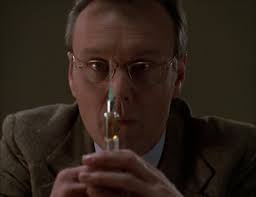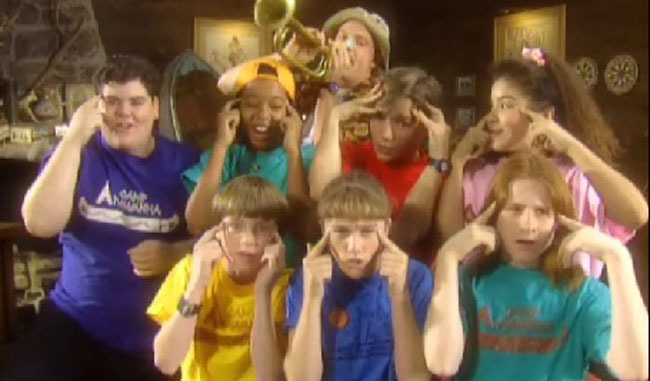Okay, so things just got good, or bad, depending on your take. Buffy delves back into the moral quandary pool, only this time Buffy herself is the one toeing the line.
As I’ve mentioned in at least one other previous blog, the slayer’s job is to kill, therefore Buffy is a killer. However, because she only kills monsters and demons (and evil robots) she is not seen as a villain. This episode, along with its companion, “Consequences,” takes this idea and plays with it. With power comes great responsibility, and on this show, who has more power than the slayer (you know, other than the other slayer)?
There’s a lot going on in this episode. It starts off with Buffy and Faith working really well together in their fight against vampires. It’s actually really great to see them fighting together and being all friendly, cause you know, that won’t last long. After the whole evil watcher thing, Faith seems to have come back around nicely, just in time to be a bad influence on Buffy.
What allows Buffy to slowly start losing (or at least testing) her moral compass? Well, that would be the arrival of new Watcher, Wesley Windham-Pryce. First of all, Alexis Denisof is awesome, and I have been waiting to see Wesley on Buffy since “Helpless.” And, wait, is his British accent more proper here than it was on Angel? Hmmm… it definitely sounds different than I remember, maybe it’s just been a while since I’ve seen his character on either show. Second, his character is such a great buffoon (“Preparation, preparation, preparation” says it all) that Giles now looks extremely cool by comparison. I do appreciate that Giles is still the school librarian. I mean, the Watcher’s Council obviously got him that job to put him in the slayer’s orbit and give him a place to hide all the occult books he would need in his capacity as Watcher, yet, Wesley just shows up at the school, starts hanging out in the library and goes unquestioned? I know that schools were much more lax about these things in the 90s, but the Watcher’s Council could have made him some sort of teacher or assistant librarian as a cover – don’t you think?
Anyways, Buffy’s reaction to having a new Watcher is great – “Is he evil? The last one was evil.” Faith’s reaction is better – “Screw that.” And then she turns around and walks out of the library. Clearly Wesley has an uphill battle here. He is also the cause of Buffy being more open to rebellion. She never liked taking orders from Giles, but he was able to find teaching moments to get her to take responsibility and never treated her like a lackey. Think back to the very first episode. Buffy is at the Bronze, still resisting the whole slayer thing, when Giles shows up. She teases him, he puts up with it and then gets her to try to hone her senses to see if there are any vampires at the club. She spots one easily and explains to Giles how she knows that he is a vampire. Giles is a bit flummoxed, as Buffy is not doing things in the traditional way, but he accepts that and he accepts her. Wesley, on the other hand, goes straight in for the orders. And he’s super uncool. She’s having none of that, so when Faith’s bad girl approach calls, she listens.
Interestingly, this is all against the backdrop of college talk. Although Buffy has applied for colleges, she still sees her future as limiting. She understands Xander, who is definitely not going to college. And Willow, of course, has early acceptances from Harvard, Yale, and Wesleyan (didn’t Joss Whedon go to the latter?). During the career fair in season 2 (the same episode that introduced Kendra) Buffy was also not feeling so great about her future. She has a better outlook now, but it is interesting that when a story about 2 slayers working together comes along, the gang’s future is being discussed yet again.
Speaking of Kendra, Buffy is the Kendra to Faith’s Buffy. Last season, Kendra had to remind Buffy that slaying isn’t a job, it’s who she is. Kendra was also a rule follower and Buffy was the impulsive one. Now Faith is reminding Buffy that slaying is who she is, but taking it a whole lot further. And because Faith is so impulsive, it puts Buffy in a more responsible position, the position that Kendra used to fill. Doug Petrie, who wrote this episode, says something to the effect that Faith is Buffy’s darker side in his episode commentary. This will come up again when Buffy is learning about Othello in English class. Comparing Buffy to other slayers is interesting. Obviously, all people are different, and therefore so too are slayers. But seeing how different slayers perceive being the slayer, and what that means, is what makes this and the next episode so important. And it’s all centered around the idea of how far a slayer can go and how far a slayer should go. Faith takes this to the extreme with her mantra of, “Want, take, have.”
Doug Petrie also talks about Buffy’s rebirth in this episode. There’s a moment when a vampire seemingly drowns Buffy and she reemerges from the water with, “I hate it when they drown me,” recalling “Prophecy Girl.” This almost drowning serves as a baptism of sorts. When Buffy emerges, she changes and is more open to bad behavior. From that moment on, she makes horrible choices up until the moment when Faith accidentally stakes a human.
This is an understandable mistake. Vampires are coming at them as they walk down an alley, and Alan, the deputy mayor, probably shouldn’t have been in that alley. Buffy sees him as he reaches for her, pushes him away, and then Faith picks up the slack, ready to pounce. As she’s about to stake him, Buffy realizes that he’s not a vampire and tries to warn Faith, but it is too late.
Brief pause: why was Alan there? He must’ve been there to tell Buffy and Faith about the Mayor, right? We’ll never know for sure unfortunately, but he did look pretty uncomfortable in the Mayor’s office with Mayor Wilkins and Mr. Trick. How did he become the Deputy Mayor? When did he find out that the guy he worked for was evil? What made him stay and why decide to speak out now? Unfortunately, we are left with a lot of questions. Of course, none of these really matter in the grand scheme of things.
Back to the murder. I have to wonder, what if their roles were reversed? What if Faith was the one who pushed Alan, and Buffy was the one who tagged in with the stake? Would Buffy have realized he was human before shoving the stake into his heart? Would Faith have noticed from afar or would she have continued moving, knowing that B can handle herself? Since Buffy is more of a thinker and more of an observer than Faith, who again is more impulsive and more about the action, would Buffy have been able to stop the murder from taking place if their roles had been reversed? This doesn’t really matter. We don’t want the hero of our show, who will always be Buffy, killing anyone, so it had to be Faith. However, how Faith handled this crisis, versus what Buffy would have done, is how you know that Buffy is a moral character and Faith is not.
I have to believe that this event affected Faith, even if she won’t admit it. She goes back to look at the body and seems genuinely upset. But then, like a Vampire Diaries vampire turning off his humanity, she makes a decision off-camera to not care. She disposes of the body (and honestly, not very well as he pops right up again in the next episode), and moves on, not wanting to discuss what happened, not wanting to think about it, and, as she tells Buffy, not even caring that she killed someone.

What follows is fodder for the next blog. While this feels like a natural ending point there is so much more to discuss here that I haven’t really even touched on.
I mean, Buffy is pushing Willow, her best friend aside. And using the same lousy excuse the whole gang used on Xander in “The Zeppo.” Doesn’t Buffy get that just by being her friend Willow and Xander will always be in danger? Poor Willow. Or what about when Xander’s eye twitches every time Faith’s name is mentioned? Or how about when Joyce says that she doesn’t want to meddle in Buffy’s slaying? I guess she learned her lesson after “Gingerbread,” huh?
I haven’t even talked about what a bad influence Faith was on Buffy. I mean, I skirted the topic, but then went straight to the murder, leaving out all the class skipping (when there’s an important test to be taken) and store robbing. For the first time, Buffy breaks the law for fun, rather than out of necessity. And then, while escaping police custody, she and Faith injure the police officers and against Buffy’s better judgement, they leave without calling for help. Buffy gets so caught up in the whole bad girl behavior thing that she actually freaks Angel out by being way too sexual with him. Sure, they’re back together, but no one wants Angel to lose his soul again and it seems as if Buffy’s too caught up in her own feelings to realize that her behavior with Angel is inappropriate. Angel has to remove himself from Buffy and get all business-like with her.
Oh, and Wesley! Yes, I talked about him, but I didn’t mention what a horrible Watcher he is. Aside from all the negative things I’ve already mentioned, he thought that the demon of the week was dead, then got kidnapped by said demon, and then was ready to blurt out everything to that demon in order to try to save his life – what an amateur! And then, because he lacks fighting skills, Giles had to save him. Now, this isn’t entirely Wesley’s fault, the Watcher’s Council doesn’t really field train their guys. You know, cause that’s the slayer’s job anyways.
And speaking of the demon of the week, when Buffy kills him he utters one more ominous line – “When he rises you’ll wish I’d killed you all.” We know that he is referring to the Mayor, but our characters haven’t figured that out yet. And Mayor Wilkins has that whole dedication ceremony that makes him invincible. A sword-wielding vampire slices his head in two, and the Mayor lives (and magically heals). This does not bode well for our hero.
At the end of this episode there is also a not-so-sneaky Shakespeare reference. Faith is washing blood out of her shirt and, metaphorically, off of her. Here, she is like Lady MacBeth, only Faith’s conscious doesn’t seem to be in play here. Faith washes out the blood, but Buffy is the one who’ll have the hard time dealing with the murder, which I’ll talk more about in the next blog.



























